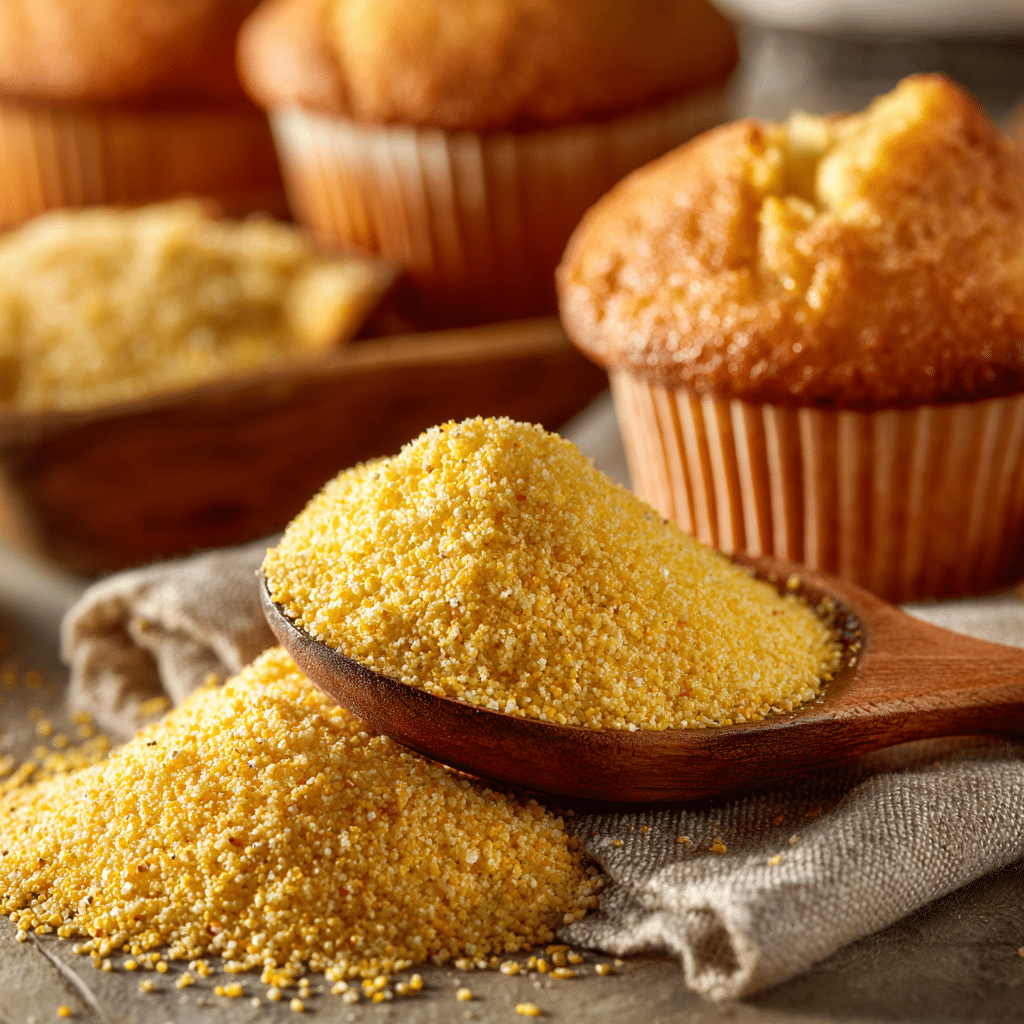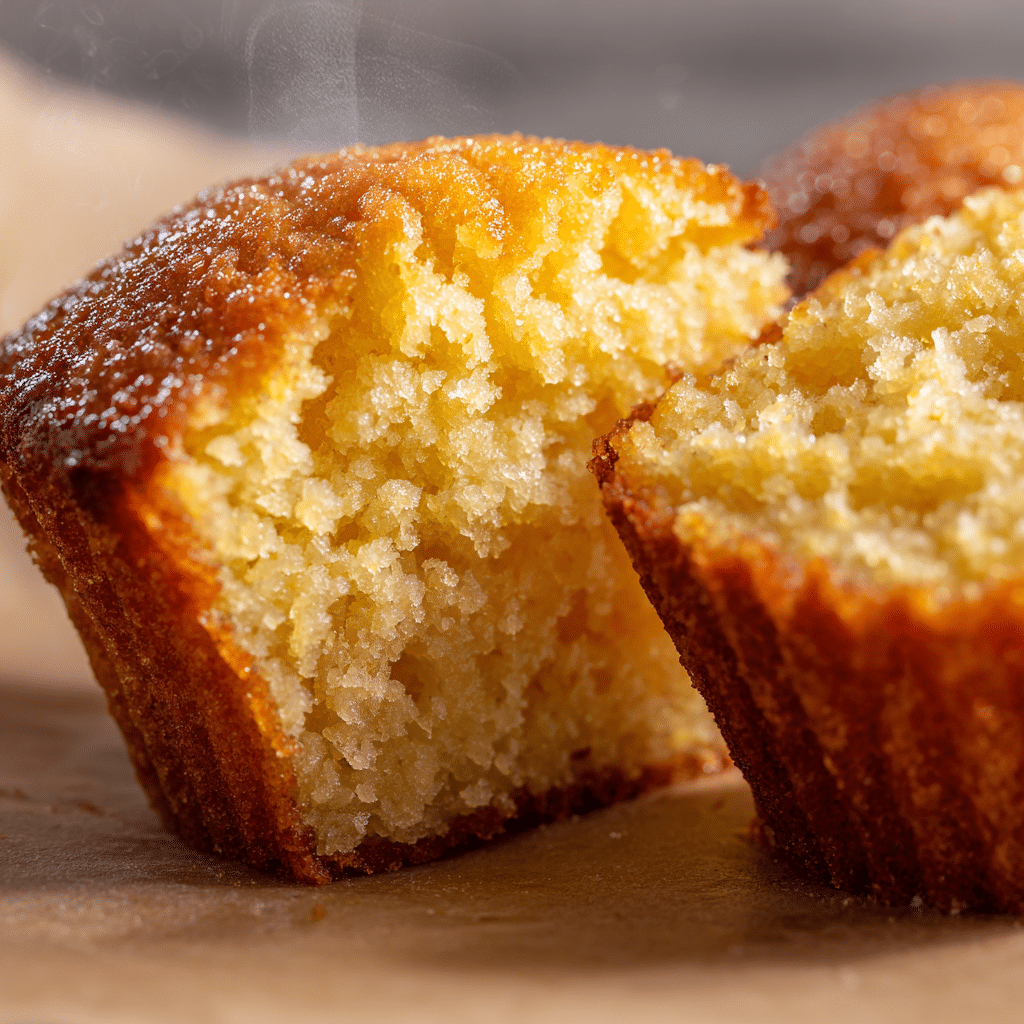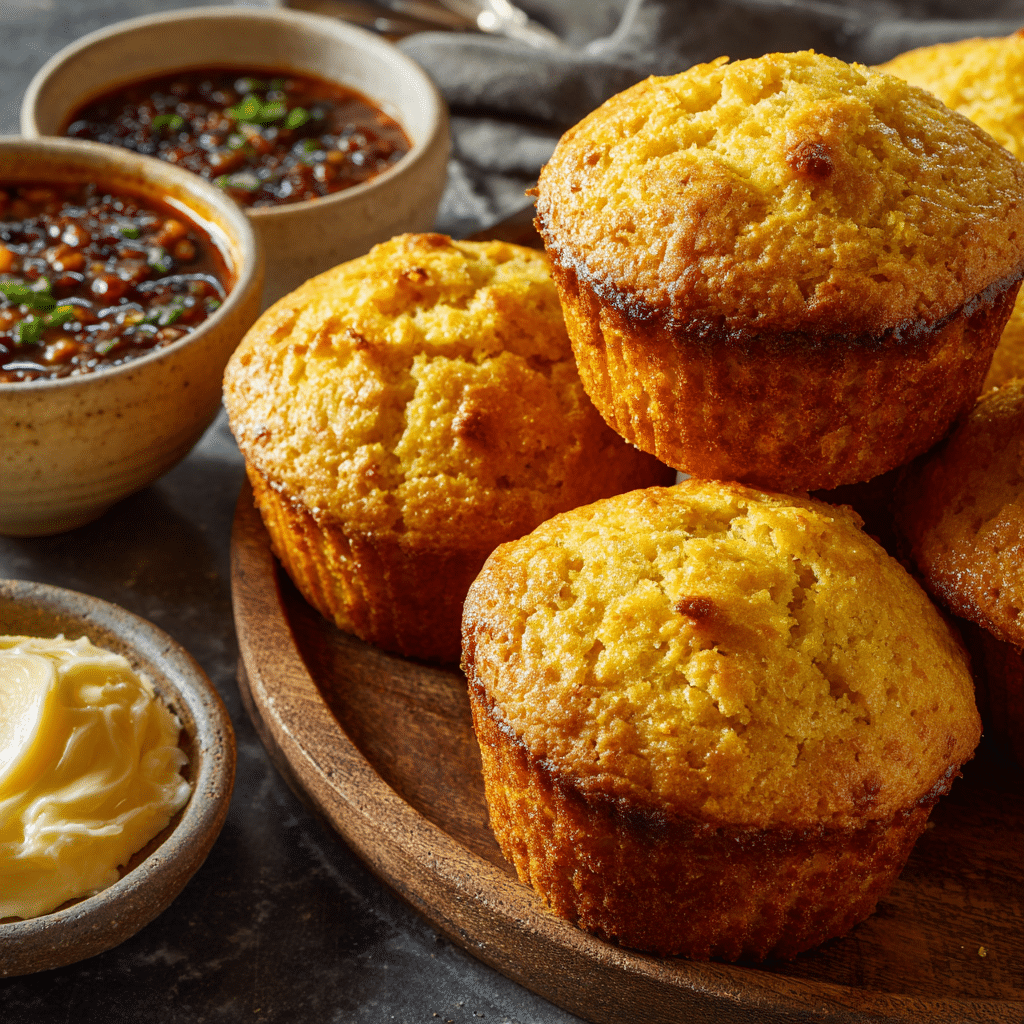Few baked goods capture the warmth of home quite like cornbread muffins. With their golden crust, tender crumb, and just the right balance of sweet and savory, they’re a comfort food staple across the South and beyond. Whether served alongside chili, barbecue, or a hearty stew, cornbread muffins bring a touch of rustic charm to any meal. In this guide, we’ll explore how to make them perfectly moist, what mistakes to avoid, and the baking secrets that give them their signature flavor.
Looking for more cozy ideas? Don’t miss our Southern comfort food collection.
Why Cornbread Muffins Are a Classic Favorite
The Origins of Cornbread in Southern Cooking
Cornbread traces its roots to Native American cuisine, long before wheat-based breads became common. When European settlers arrived in the South, cornmeal became a pantry essential cheap, versatile, and abundant. Over time, regional variations developed: sweet cornbread in the North, and savory, crumbly versions in the South.
Cornbread muffins emerged as a convenient, individual-sized version of traditional skillet cornbread. They bake faster, portion easily, and maintain a soft interior while developing a crisp golden top.
Why Muffins Are Easier and More Versatile Than Traditional Cornbread
While traditional cornbread often requires a cast-iron skillet and careful timing, muffins are simple enough for any baker. You can easily customize them add cheese, jalapeños, honey, or bacon bits for flavor variety. They’re also ideal for portion control and freeze well for later meals. Whether served with honey butter or savory chili, cornbread muffins deliver comfort in every bite.
The Secret to Perfect Corn Muffins

Choosing the Right Cornmeal Texture
The foundation of any great cornbread muffin is the cornmeal itself. The texture of your cornmeal can dramatically change the outcome. Medium-grind cornmeal provides a satisfying bite and rustic texture without making the muffins gritty. Fine-grind cornmeal produces a smoother, cake-like result, while coarse cornmeal can make the muffins dry or crumbly. For best results, choose stone-ground cornmeal with a fresh, natural aroma it gives the muffins a rich, corn-forward flavor.
Balancing Sweetness and Salt for Flavor Harmony
The great cornbread debate sweet or savory comes down to regional taste. Southern-style muffins are usually less sweet, allowing the corn’s natural flavor to shine, while Northern-style versions use more sugar or honey for a dessert-like bite. A good rule of thumb:
- For savory muffins, use 1–2 tablespoons of sugar.
- For sweet muffins, go for ¼–⅓ cup of sugar or honey.
Don’t forget salt it enhances the corn’s natural sweetness and brings balance. The perfect cornbread muffin walks the fine line between sweet and savory, complementing both main dishes and breakfast spreads.
Common Cornbread Muffin Mistakes
Overmixing the Batter
One of the biggest reasons cornbread muffins turn out tough or dry is overmixing the batter. Once you combine the wet and dry ingredients, stir just until they’re incorporated no more than 10–12 gentle stirs. Overmixing activates the gluten in the flour, which makes the muffins dense instead of tender. It’s okay if a few small lumps remain in the batter; they’ll disappear as the muffins bake.
Incorrect Oven Temperature or Baking Time
Another common mistake is baking at the wrong temperature. Cornbread muffins should bake at 375°F (190°C) for about 15–18 minutes, depending on size. If the oven is too hot, the tops may brown too quickly while the centers stay undercooked. Too low, and they’ll dry out before developing that golden crust. Always preheat your oven and use an oven thermometer if possible for consistent results.
Avoiding these pitfalls ensures your muffins come out perfectly soft inside and lightly crisp on the outside—every time.
The Secret to Moist Muffins

The Role of Fat, Milk, and Eggs in Moisture
The key to tender, moist cornbread muffins is striking the right balance of moisture-rich ingredients. Butter adds richness and flavor, while oil (like vegetable or canola oil) helps the muffins stay soft for longer. A combination of both often yields the best texture.
Milk or buttermilk provides structure and creaminess especially buttermilk, which slightly acidifies the batter and tenderizes the cornmeal. Eggs are the binding agent, giving your muffins a fluffy rise and holding everything together.
For the best results, avoid overbaking and test doneness early. When a toothpick inserted in the center comes out clean or with a few moist crumbs, your muffins are ready.
How to Store Muffins to Stay Soft for Days
Once cooled, store cornbread muffins in an airtight container at room temperature for up to 3 days. To extend freshness, wrap them individually in plastic wrap and refrigerate for up to 5 days. For long-term storage, freeze the muffins in a sealed bag for up to 3 months just reheat in the oven at 325°F (160°C) for about 10 minutes.
Adding a slice of bread to the container helps retain moisture by absorbing extra air.
With the right ingredients and storage methods, you’ll enjoy moist, bakery-quality cornbread muffins every time.
The Secret to Good Cornbread
Proper Ratios of Cornmeal to Flour
One of the defining qualities of cornbread and by extension, cornbread muffins is the ratio of cornmeal to flour. Too much cornmeal can make the muffins crumbly and dry, while too much flour results in a cake-like texture that lacks authentic cornbread flavor. The ideal balance is usually around 2 parts cornmeal to 1 part flour. This ratio provides enough structure to hold the muffins together while keeping that classic corn-forward taste.
How to Get a Golden Crust Without Dryness
A great cornbread muffin should have a golden, slightly crisp crust but still be moist inside. To achieve this:
- Preheat your muffin tin in the oven for a few minutes before adding the batter this jumpstarts browning.
- Use cast iron muffin pans or dark, heavy pans if available, as they retain heat and create a better crust.
- Brush each muffin cup with melted butter or oil before adding the batter for an extra golden edge.
With the right ratios and baking technique, you’ll have muffins that taste as authentic as Southern kitchen classics.
What Gives Cornbread the Best Flavor
The Impact of Buttermilk and Butter
If you’ve ever wondered why some cornbread muffins taste richer and more flavorful, the secret often lies in buttermilk and butter. Buttermilk not only adds tanginess but also reacts with baking soda to give a lighter, fluffier crumb. Butter, on the other hand, provides depth of flavor that oil alone can’t replicate. A mix of both butter and oil gives you the best of both worlds: flavor and long-lasting moisture.
Sweet vs Savory Flavor Variations
Flavor preferences vary widely depending on where you’re from. Southern-style cornbread muffins lean savory with little or no sugar, often paired with hearty dishes like chili or barbecue. Northern-style cornbread muffins include more sugar or honey, making them taste almost like dessert.
For creative twists, try adding:
- Cheddar cheese and jalapeños for a spicy kick.
- Honey or maple syrup for natural sweetness.
- Herbs like rosemary or thyme for a savory, aromatic note.
By tailoring sweetness and mix-ins, you can create cornbread muffins that suit every palate and occasion.
Milk vs Water in Cornbread
Why Milk (or Buttermilk) Improves Texture
When it comes to baking cornbread muffins, milk or buttermilk is far superior to water. Dairy adds creaminess, protein, and fat, all of which improve texture and flavor. Buttermilk, in particular, adds a slight tang that balances sweetness and enhances the natural corn flavor. It also tenderizes the crumb, creating moist, fluffy muffins with a rich golden color.
When to Use Water or Dairy Alternatives
Water can be used in a pinch, but it won’t deliver the same richness or structure. If you’re avoiding dairy, consider using plant-based alternatives like almond milk, oat milk, or soy milk. For best results, choose unsweetened versions so the cornbread flavor isn’t overshadowed. Adding a tablespoon of oil or melted dairy-free butter to the batter can mimic the creaminess of milk.
In short, while water will get the job done, milk or buttermilk ensures muffins with superior flavor and texture every time.
Step-by-Step Cornbread Muffin Recipe
Ingredients & Preparation
Here’s a simple, classic recipe for fluffy and moist cornbread muffins:
| Ingredient | Amount | Notes |
|---|---|---|
| Yellow cornmeal | 1 cup | Medium-grind for best texture |
| All-purpose flour | ½ cup | Balances structure with softness |
| Baking powder | 1 tbsp | For a good rise |
| Baking soda | ½ tsp | Enhances rise with buttermilk |
| Salt | ½ tsp | Flavor enhancer |
| Sugar (optional) | 2–4 tbsp | Adjust based on sweet/savory style |
| Buttermilk (or milk) | 1 cup | Adds moisture and tenderness |
| Egg | 1 large | Binds ingredients |
| Unsalted butter, melted | ¼ cup | Adds richness and flavor |
| Vegetable oil | 2 tbsp | Keeps muffins moist longer |
Preparation Steps:
- Preheat oven to 375°F (190°C) and lightly grease or line a 12-cup muffin tin.
- In a large bowl, whisk together cornmeal, flour, baking powder, baking soda, salt, and sugar (if using).
- In a separate bowl, whisk buttermilk, egg, melted butter, and oil until combined.
- Pour wet ingredients into dry ingredients. Stir gently until just combined do not overmix.
- Divide batter evenly among muffin cups, filling about ¾ full.
- Bake for 15–18 minutes, or until golden brown and a toothpick comes out clean.
- Cool slightly before serving warm with butter, honey, or jam.
Baking Instructions
These muffins are best enjoyed warm on the day they’re baked, but they also freeze beautifully. Wrap cooled muffins individually and store in a freezer-safe bag for up to 3 months. Reheat in the oven at 325°F (160°C) for 10 minutes for that just-baked taste.
Serving & Pairing Ideas

What to Serve with Cornbread Muffins
Cornbread muffins are one of the most versatile side dishes you can make. They pair wonderfully with both savory and sweet meals. Popular pairings include:
- Chili and soups – The slightly sweet, crumbly muffins balance spicy or hearty flavors.
- Barbecue meats – Pulled pork, ribs, or brisket taste even better with cornbread on the side.
- Holiday dinners – Add them to your Thanksgiving or Christmas table as a warm, rustic bread option.
- Breakfast spreads – Serve with honey butter, jam, or eggs for a comforting morning meal.
How to Turn Leftovers into New Dishes
Don’t let leftover muffins go to waste. Try these easy ideas:
- Cornbread stuffing – Cube and toast muffins to use in a savory holiday stuffing.
- Cornbread croutons – Cut into chunks, season, and bake until crisp to top salads or soups.
- Cornbread pudding – Combine with milk, eggs, and spices for a sweet twist on bread pudding.
- Mini sandwiches – Slice in half and use as sliders for pulled pork or fried chicken.
These simple ideas transform leftover muffins into delicious new meals, proving just how versatile this classic recipe really is.
FAQs About Cornbread Muffins
What is the secret to perfect corn muffins?
The secret lies in using medium-grind cornmeal for texture, balancing cornmeal with flour for structure, and mixing the batter lightly to avoid toughness. Baking at the right temperature (375°F) also ensures a golden crust and fluffy inside.
What are common cornbread muffin mistakes?
Overmixing the batter and baking at the wrong temperature are the two biggest mistakes. Overmixing creates dense muffins, while baking too hot or too cool can make them dry or undercooked.
What is the secret to moist muffins?
A mix of butter and oil provides both flavor and long-lasting moisture. Using buttermilk instead of water also tenderizes the crumb. Proper storage in an airtight container keeps them soft for days.
What is the secret to good cornbread?
Good cornbread comes from the right cornmeal-to-flour ratio (2:1), just enough sweetness to balance the corn flavor, and baking techniques that create a golden crust without drying the inside.
What gives cornbread the best flavor?
Buttermilk and butter are key. Buttermilk adds tang and tenderness, while butter gives richness. Mix-ins like cheese, jalapeños, or honey can also elevate the flavor profile.
Is it better to use milk or water in cornbread?
Milk or better yet, buttermilk is far better than water. Dairy adds creaminess, protein, and fat, which improve texture and flavor. Water can work in emergencies but results in less flavorful muffins.
Conclusion
Cornbread muffins are the perfect balance of comfort, flavor, and versatility. Whether you enjoy them sweet or savory, made with fresh buttermilk or pantry-friendly ingredients, the key is in the texture and balance. By avoiding common mistakes, using the right ratios, and adding your favorite flavor twists, you can bake moist, golden muffins every time. Pair them with chili, barbecue, or even breakfast spreads, and you’ve got a timeless recipe that works for every occasion.
Looking for more baking inspiration? Check out our baking tips for even more Southern classics.

Classic Cornbread Muffins
Ingredients
Equipment
Method
- Preheat oven to 375°F (190°C). Grease or line a 12-cup muffin tin.
- In a large bowl, whisk together cornmeal, flour, baking powder, baking soda, salt, and sugar.
- In a separate bowl, whisk together buttermilk, egg, melted butter, and oil.
- Pour the wet ingredients into the dry ingredients. Stir gently until just combined—do not overmix.
- Divide the batter evenly among the muffin cups, filling each about ¾ full.
- Bake for 15–18 minutes or until golden brown and a toothpick inserted comes out clean.

